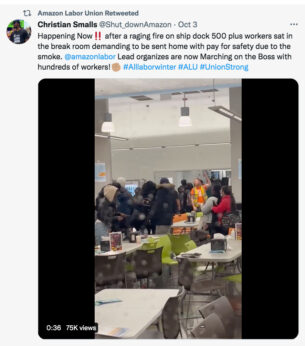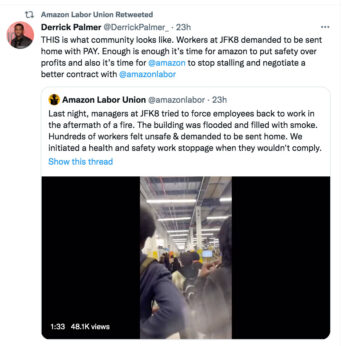
On the afternoon of Oct. 3, a fire occurred at the sorting center at Amazon’s JFK8 warehouse in Staten Island, N.Y. The blaze started when a cardboard-box compactor at a loading dock ignited just before a scheduled shift changeover. With fumes and the smell of chemicals still hanging in the air after the fire was doused, Amazon ordered workers arriving for their evening shift to get to work—even after the employees expressed concerns for their health. As a result, 650 workers entered the break room, and another group went to the Human Resources department demanding they not be subject to unsafe working conditions. Amazon responded by suspending 80 workers in what labor leaders are calling a clear act of anti-union retaliation. The incident is the latest episode in a long history of the company refusing to uphold safety protocols, risking workers’ lives in order to secure maximum profit. You can read more details on the situation here. People’s World talked with David Sherwood, a lead Amazon Labor Union (ALU) organizer and one of the workers suspended after the fire.
People’s World: Could you tell us about the fire that happened on Oct. 3? You were part of the group of workers that got suspended. How are you feeling now, and also how are other workers feeling?
David Sherwood: I am a Shift Dock Worker at JFK8. It’s our job as palletizers to take the packages, scan them, and then put them in their respective loading go-cart or palette. I picked up a shift that day from 2:00 PM to 5:45 PM, just a couple of hours to make a little bit of extra overtime. The fire happened on the dock while I was there. Just before 4:00, all of a sudden, the fire alarm started going off and the lights were flashing for the fire alarm. No one thought anything of it because we have false alarms on a regular basis. Our fire alarm system has been under repair for a while, this is what the company has told us, so we’ve been trained to ignore it because we get these false alarms all the time. We’re at our stations, and then in the distance, you can hear people screaming and it sounds like people are really freaking out. At first, you hear it but then you see people running, and right when I turn around, I hear on the intercom they’re finally yelling “Evacuate!”
What was the company’s management of the evacuation like?
 We were standing there for probably a good minute and a half or two minutes before we actually got the evacuation message officially. Meanwhile, there’s a fire going on in the building, and we are surrounded by flammable materials like wooden pallets, cardboard. And some of the packages have things like weed killer or batteries in them. That was all worrying enough. When the actual evacuation process started, it was so much worse.
We were standing there for probably a good minute and a half or two minutes before we actually got the evacuation message officially. Meanwhile, there’s a fire going on in the building, and we are surrounded by flammable materials like wooden pallets, cardboard. And some of the packages have things like weed killer or batteries in them. That was all worrying enough. When the actual evacuation process started, it was so much worse.
We darted toward the nearest fire exit, and managers actually came by and ushered us away from the fire exit and funneled everybody out of a single exit on the dock. If that doesn’t break the law then I don’t know what does, because I feel like it’s supposed to be you go out the nearest exit. We were funneled out of a single fire exit that was closest to the manager’s desk. We were outside in the rain for about 45 minutes. The few people who had umbrellas were trying to shelter three or four people under an umbrella because it was pouring. As I’m walking back to my car, I also notice night shift people walking into the building.
Amazon did not notify night shift workers there was a fire?
The company did not inform the night shift of any blaze; the workers were walking in and maybe they thought it was a drill. The company ushered everybody into the breakroom. But there were also reports from people saying that the building still smelled like smoke. Specifically, people who told me they were asthmatic, that their throat hurt, their chest felt tight, and that it did not smell good within the building.
Around 7:00 pm, a bunch of lead organizers, including myself, Derrick Palmer, Michelle Valentine Nieves, and Tristen Martinez all decided to go down and talk to people. We get down there, and when you walk in, the smell of smoke hits you, and the fire’s out but the air quality in the building is diminished. A lot of people in the break rooms have no idea what’s going on, basically everybody.
What were night shift workers’ reactions to finding out what happened?
People were rightfully furious. They were saying, “Why weren’t we told, why didn’t anybody let us know? That’s why this building smells terrible.” At that point, people became really frustrated; the frustration in the room was peaking. We had 300 workers sitting in the breakroom refusing to go back to work. Managers at this point were using speakers and telling people, “This section is clear to go back to work.”
But there was no fire department on site, so we had no idea what was making it okay for them to clear certain areas. There were a lot of people that were refusing to go back, who were really upset and that’s when the chants started. A “Send us home with pay” chant was the first major thing, and it progressed from there. I had a video of the fire, so I was able to send that to people, show people on my phone, and that just really added to people’s mistrust in Amazon. It wasn’t even a small fire; it was an entire trash compactor. This specific trash compactor has had issues before. Less than a month ago, it started smoking, so Amazon was aware that this particular machine had issues but nothing was done. Ultimately it went up in flames.
As one of the organizers with the Amazon Labor Union, do you think conversations centered around worker safety align with the goals of the ALU, including for their fighting toward official recognition?
Absolutely. Workers have said before, “Why does it seem like there’s no fire drills ever?” I’ve talked with one worker, and he let me know that through his four years at JFK8, he’s been a part of only one fire drill. The company is completely dropping the ball, either not doing drills or doing them ineffectively. It went from people refusing to go back to work, to chanting, to management coming over threatening people with a time-off-task write up, meaning you’re not working so you will get a write up. Eventually, that turned into a wildcat strike. People did not want to go back to work and did not feel safe because the building smelled of smoke and some workers had asthma.
At this point, the march to the HR office began?
 Yes, we led over a hundred workers and marched to the main office, demanding the building close and everybody be sent home with pay. Amazon has done it before for various other reasons, like when there’s a building maintenance day they need. But with an actual fire, they didn’t want to shut the building down and send people home with pay. Also, they are completely capable of sending out mass communication with ease.
Yes, we led over a hundred workers and marched to the main office, demanding the building close and everybody be sent home with pay. Amazon has done it before for various other reasons, like when there’s a building maintenance day they need. But with an actual fire, they didn’t want to shut the building down and send people home with pay. Also, they are completely capable of sending out mass communication with ease.
They send out texts on a daily basis for shifts to pick up, they send texts on a daily basis for surveys, and during the union election, workers got texts on a daily basis telling them to vote ‘no’ for the union, but they couldn’t send a message to workers about a fire on site? It led to a lot of anger from workers, and as a result, we were all participating in collective action and we knew our federally-protected rights.
As the night went on, the threats continued, and the management was giving really mixed messages. The lawyer Seth Goldstein posted the video to his Twitter account, showing the head of HR night shift on video saying, “If people don’t feel safe going back to work, he encourages them to leave and that their time will be addressed.”
But people who did leave got suspension letters. There was also an area manager named Joe telling workers if they did not return to work he was going to give them a Final Write Up, which means any other action past that point would mean termination. All of these threats were illegal, but it scared a lot of people. You were put into a situation where if you left you got suspended, if you sat in the breakroom you got suspended, and if you went to work as you were told you were suspended.
This event definitely had a major impact. Sometimes employees think, ‘If I just do my job the company will treat me well.’ But this episode seems to make it clear that the company’s alliance is with profit and not with the workers.
No, they don’t care about us. It’s worth noting that the warehouse in Schodack (Albany, N.Y.), the one that is having their union election, ALB1, had a fire last night caused by the exact same thing—a cardboard compactor combusting. Sara Chaudhry, one of the lead organizers at ALB1 said to me that she believes one of the main reasons Amazon closed down her warehouse is because of the actions we as workers at JFK8 in Staten Island did. The company did not want to deal with that again up there. I also think the main reason they want to keep our building open is because we produce so much, and we’re such a profitable building that they didn’t want to close for any amount of time.
As you said, all of these threats are about controlling any kind of worker-led dissent.
Going over the situation with workers and calling them, almost all of the people I’ve talked to either left and got suspended or went back to work and still got suspended, even after doing what they’re told. So it’s about instilling fear, and it’s a tactic to not have workers use their voice. At the end of the day, it’s scaring some people, but it’s also firing up a lot of people. It’s good that we are getting media coverage with this event, it puts the pressure on Amazon.
This company cannot keep getting away with the stuff they pull against workers.










